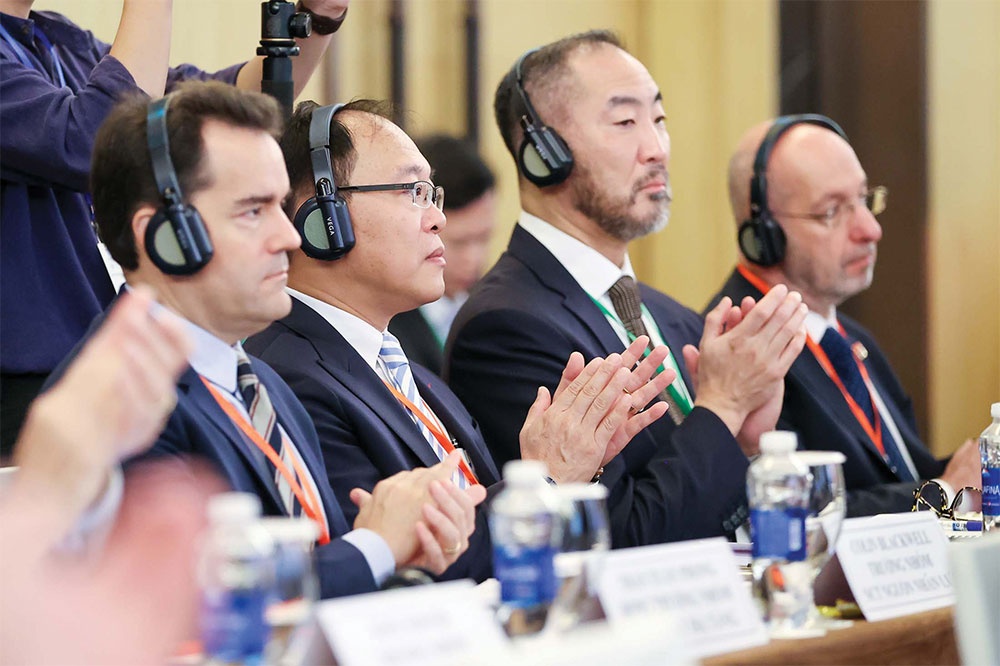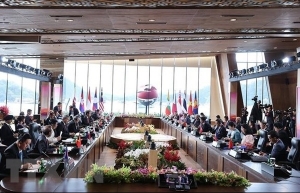Wider interest raised through ASEAN deals
Regional member states of the Regional Comprehensive Economic Partnership (RCEP) have agreed that they should adopt a more holistic approach to building a competitive investment facilitation environment, which will allow them to woo more foreign funding within the bloc and from its five partners of China, Japan, South Korea, Australia, and New Zealand.
 |
| Wider interest raised through ASEAN deals |
Under this approach recently debated by regional economic ministers, investment facilitation should incorporate business facilitation and other measures not limited to foreign investment procedures alone. Synergies should be sought between funding facilitation efforts and the activities and tools of authorities other than promotion agencies.
Investment facilitation should cover business registration and approvals, licences, and other administrative requirements and processes, and tax-related and social security procedures, for example. Investors will consider the efficiency and effectiveness of a country’s entire administrative process from obtaining permits, to incentives to the steps in registering and operating a business in the country.
Facilitation will also be leveraged by advantages from the RCEP that ASEAN and the additional five nations inked in November and which took effect in 2022, according to the ASEAN Secretariat.
Under the RCEP’s commitments, member states committed to remove 87.8-98.3 per cent of tariff lines for Vietnam, and ASEAN countries pledged to do that with 85.9-100 per cent of tariff lines. The longest roadmap for tariff elimination is 15-20 years from when the RCEP became valid.
The Vietnamese government stated that ASEAN enterprises need to take all advantage of opportunities offered by the RCEP, which is the world’s biggest multilateral free trade agreement covering 30 per cent of both global GDP and the global population.
“The RCEP will help enterprises to expand markets, and develop production chains and value chains, with harmonised regulations on origins, tariff and customs procedures, quarantine, and technical standards,” said Prime Minister Pham Minh Chinh.
“Besides the RCEP, member states need to effectively implement the ASEAN Master Plan on Industry 4.0 and the ASEAN Agreement on Electronic Commerce, which can strongly help boost digital transformation, attract overseas funding, and facilitate regional connectivity and economic recovery.”
According to pan-Asia consultancy firm Dezan Shira & Associates, as the RCEP is focused on trade facilitation, the blue-collar sector is expected to benefit the most. Additionally, consumer sectors like tourism, education, entertainment, healthcare, and retail are also expected to benefit as the middle class expands. Further, Vietnam’s export-oriented industries such as IT, agriculture, automobiles, footwear, and telecommunications are expected to see gains.
Major leverage
The ASEAN Secretariat in its Investment Report 2023 said that despite ongoing uncertainty in the global economy, the bloc is well-placed for continued growth.
“Its industrial sector is developing fast; regional integration is deepening; there are growing numbers of middle-income consumers feeding into demand; and there is a consistent policy push from governments. For foreign investors, the ASEAN market is increasingly hard to ignore,” the report stated.
The interaction of internal factors, for example regional integration and market attraction, and external factors such as strengthening supply chain capacity and regional corporate expansion strategies favourable to the region, will help sustain a high level of inflows, said ASEAN Secretariat added.
With a large market and strong regional integration, ASEAN remains a major FDI destination in the developing world – second only to China – and will play an important role in driving global economic recovery.
“Over the past few years, ASEAN member states have undertaken significant efforts to attract and retain FDI. They are now stepping up this endeavour through the adoption of an ASEAN Investment Facilitation Framework in 2021, reflecting ASEAN’s continued commitment to improve the ease of doing business in the region,” said the ASEAN Secretariat.
Notably, the ASEAN Secretariat has appreciated the investment facilitation in Vietnam, which it said boasts great potential to attract more overseas funding both inside and outside ASEAN.
“The investment environment in Vietnam has improved over the years, as corroborated by survey findings from foreign chambers of commerce based in the country,” it said. “The government has introduced measures to simplify requirements, reduce steps, and streamline processes to facilitate more funding.”
Specifically, the Vietnamese government has continued to reform and take steps to further improve the country’s investment environment, including implementing resolutions and regulatory directives on strengthening information provision, simplifying processes, and reducing administrative requirements.
For example, the existing Law on Investment covers Vietnam’s efforts to attract FDI, including in certain activities such as university education, pollution mitigation and medical research. It also addresses the granting of incentives to promotion activities.
Moreover, the Law on Public-Private Partnership Investment prioritises key industries such as transportation, electricity grid and power plants, irrigation, water supply and treatment, healthcare, and IT infrastructure.
Vietnam in focus
Meanwhile, guidance on the implementation of the Law on Investment in 2021 highlighted efforts in creating an open mechanism, overcoming bottlenecks in business activities, strengthening local decentralisation, ensuring transparency, and providing additional investment incentives and special support.
For example, Thailand’s Siam Cement has expanded operations in Indonesia, Singapore, and Vietnam and increased its investment in retail and logistics businesses in Cambodia, Indonesia, Myanmar, the Philippines, and Vietnam. It is building a $5.1 billion petrochemical complex in Vietnam, which will be completed in 2023.
In 2021-2022, Thailand’s PTT Global Chemical has expanded operations and partnerships in manufacturing and retail activities in Cambodia, Indonesia, Laos, Myanmar, and Vietnam.
Elsewhere, Singapore’s Sembcorp Development, a subsidiary of Sembcorp Industries, is developing the 12th Vietnam-Singapore Industrial Park (VSIP) in Vietnam’s Mekong Delta city of Can Tho. In February 2023, VSIP Group obtained approval from the Vietnamese government to set up its second industrial park in the north-central province of Nghe An.
Piyapong Jriyasetapong, chairman of the Thai Chamber of Commerce and Industry in Vietnam, said Thai firms are greatly interested in the Vietnamese market.
“A significant factor that attracts Thai investors into Vietnam is that this nation is now entering a golden decade of economy. We believe they will invest in Vietnam even more in the coming years. This will help Vietnam attract more FDI,” said Jriyasetapong.
“Thai investors are interested in conducting business in a series of sectors in Vietnam, and we believe we are leading of these sectors in the country,” he continued. “These sectors include feed and farming, renewable energy, packaging, retail and distribution, petrochemicals, foodstuff processing, plastic products, and energy drinks. Growing local consumption in Vietnam will be one of the key drivers of economic growth, and it is thus soliciting Thai investors in these sectors the most.”
In another case, Japanese investors are also hunting for more opportunities in Vietnam. In 2021, one group registered to invest in the O Mon II thermal power project with $31 billion, and in the Vina Kraft paper factory with $611.4 million.
Under a survey by the Japan External Trade Organisation (JETRO) on Japanese investment in Asia and Oceania last year, Vietnam’s economy continues to recover, and its business expansion intend to rank first in the ASEAN. The survey received responses from 603 Japanese enterprises operating in Vietnam and most of them wished to expand their business and operation in Vietnam.
Regarding business prospects, in 2022, almost half of surveyed Japanese businesses answered “improved”, and in 2023 the percentage was 53.6 per cent.
According to JETRO, the main reason for the improving business profits in Vietnam, especially the manufacturing and consumption industry and service industry, is due to the increase in exports and domestic’s consumption. Both manufacturing and non-manufacturing sectors are forecast to improve by 50 per cent in 2023.
In addition, 60 per cent of Japanese enterprises said they would expand their investment in Vietnam in the next one to two years, up 4.7 points from the previous year. It was the highest among Southeast Asian countries, after India (72.5 per cent) and Bangladesh (71.6 per cent).
According to Vietnam’s Ministry of Planning and Investment, in the first four months of 2023, the total newly registered capital, adjusted capital, and capital contributions and share purchases of foreign investors stood at about $8.88 billion, equivalent to 82.1 per cent on-year. Total FDI disbursement hit $5.85 billion, down 1.2 per cent on-year but up 1 per cent as compared to the first three months of 2023.
Accumulatively as of April 20, Vietnam had 37,065 active foreign-funded projects registered at over $445.87 billion.
 | Indonesia deploys over 12,000 soldiers, police officers for 42nd ASEAN Summit The Indonesian National Armed Forces (TNI) and the National Police (Polri) held a security exercise on May 6 for the 42nd ASEAN Summit which will take place from May 9-11 in the town of Labuan Bajo, East Nusa Tenggara province. |
 | ASEAN Village Network to promote regional comprehensive cooperation The ASEAN Village Network (AVN) will focus on three cooperation areas in its implementation namely tourist village, digital village and One Village One Product (OVOP), in order to promote the comprehensive connectivity and development in the region. |
What the stars mean:
★ Poor ★ ★ Promising ★★★ Good ★★★★ Very good ★★★★★ Exceptional
Related Contents
Latest News
More News
- MAE names big 10 policy wins in 2025 (February 06, 2026 | 08:00)
- US firms deepen energy engagement with Vietnam (February 05, 2026 | 17:23)
- Vietnam records solid FDI performance in January (February 05, 2026 | 17:11)
- Site clearance work launched for Dung Quat refinery upgrade (February 04, 2026 | 18:06)
- Masan High-Tech Materials reports profit: a view from Nui Phao mine (February 04, 2026 | 16:13)
- Hermes joins Long Thanh cargo terminal development (February 04, 2026 | 15:59)
- SCG enhances production and distribution in Vietnam (February 04, 2026 | 08:00)
- UNIVACCO strengthens Asia expansion with Vietnam facility (February 03, 2026 | 08:00)
- Cai Mep Ha Port project wins approval with $1.95bn investment (February 02, 2026 | 16:17)
- Repositioning Vietnam in Asia’s manufacturing race (February 02, 2026 | 16:00)

 Tag:
Tag:


















 Mobile Version
Mobile Version